Current IssueFrom the Editors
After protests and occupations temporarily shut down ICE offices, Donald Trump suffered a significant political defeat when he was forced to reverse himself on separating immigrant children from their parents after they were arrested at the border. By and large, people were horrified at the separation of kids from their families and at the creation of what were basically prison camps for children. Polls showed that only about a quarter of the U.S. population supported Trump on this child-hostage policy, though about half of Republicans did. Walkouts Teach U.S. Labor a New Grammar for Struggle
Like the Arab Spring, the U.S. “Education Spring” was an explosive wave of protests. Statewide teacher walkouts seemed to arise out of nowhere, organized through Facebook groups, with demands for increased school funding and political voice for teachers. Though the walkouts confounded national media outlets, which had little idea how to explain or report on the movements, for parent and teacher activists who have been organizing against reforms in public education over the past four decades, the protests were understandable, if unexpected. What was surprising was their breadth of support (statewide), their organizing strategy (Facebook), and their breathtakingly rapid spread. What’s Left of the Brazilian Left?Reasons for Cautious Optimism from the Landless Workers Movement
In May 2017, Left politics in Brazil were pretty bleak. It was almost a year after the impeachment of President Dilma Rousseff of the Brazilian Workers Party (PT), whose ousting from power brought along with it an onslaught of austerity policies.2 "Marxism and Freedom" After Sixty Years, For Yesterday and Today
It is the sixtieth anniversary of Raya Dunayevskaya’s Marxism and Freedom, a work both of its time and ahead of its time. Reconnecting Reform and Revolution: Socialists in the Mist
If one thing was clear coming out of the New York City Democratic Socialists of America’s May 5 convention, it was that most delegates uniformly consider themselves socialists and aspire to build an anti-corporate resistance movement nationwide. So far, so good. Black Neighborhoods MatterAn Interview with Lawrence Brown on Community Trauma and Healing
Lawrence Brown associate professor of public health in the School of Community Health and Policy at Morgan State University. He is the grandson of sharecroppers who lived in the Mississippi Delta and a native of West Memphis, Arkansas. He is a historian, critical geographer, and political economist who sees public health from a critical, interdisciplinary perspective and advocates for holistic approaches to healing the Black communities of Baltimore. His book The Black Butterfly: Why We Must Make Black Neighborhoods Matter (Johns Hopkins Press) is forthcoming. Battleground SeattleA Clash of Classes and a Brewing Perfect Storm
Inequality Was Increasing Before Trump
The Federal Reserve Board, the bankers’ bank, has put out figures and reports showing that even before the Trump regime, the rich were acquiring a larger share of the nation’s total income and wealth. The September 2017 Federal Reserve Bulletin reports that “the distribution of income and wealth has grown increasingly unequal in recent years.”1 Other government reports show that many continue to live in poverty and lack shelter and an adequate amount of food. Our Passive Society
Sitting alone in my room watching videos on YouTube, hearing sounds from across the hall of my roommate watching Netflix, the obvious point occurs to me that a key element of the demonic genius of late capitalism is enforcing a crushing passiveness on the populace. Socialism as Pacifism
At time of writing, we are still in the dissipating wake of another mass shooting in the United States, this time in a Parkland, Florida, high school. The American people are once again reminded of the ubiquitous threat of violence that characterizes their everyday lives. We are once again confronted with the nauseating reality of a two-party system that defends this violence in word and deed—while providing rhetorical paeans to security, freedom, and safety. Libya under Gaddafi
A CNN report last November about slave auctions in present-day Libya shocked the world.1 The existence of these slave auctions was widely treated as a new development in the country and a result of the chaos that resulted from the NATO-supported overthrow of Colonel Muammar Gaddafi. In truth, however, what CNN discovered is but a surviving remnant of Gaddafi’s regime—the Libyan Arab Jamahiriya—a police state with systematic racism and abuse both of Libyans of sub-Saharan African descent and of sub-Saharan African migrants. Political Visual Narrative
This season’s roundup of nonfiction comics includes self-published and small-press titles as well as noteworthy releases from major trade publishers. Topics covered range from consumer capitalism and imprisoned anarchists to Trinidadian social history and the war in Syria. Each of these titles deploys a distinctive approach to the challenge of folding political themes into visual narrative. In different ways, these books suggest that the forward march of political cartooning continues unabated. What I Saw at the (Political) Revolution
Radical America
Why the United States has not developed a permanent socialist movement has perplexed activists and theorists for more than a century. Paul Le Blanc takes up that query as an activist who wants to see an anti-capitalism mass movement take shape in twenty-first century America. To that end, he investigates some of the moments when the possibility of a significant left presence in the United States seemed at hand. He focuses on what made those movements viable and what thwarted their long-term success. The volume’s fourteen essays were written over a period of thirty years, from 1986 to 2015. Class DOES Matter
Steve Fraser is a weathered veteran of the New Left and many subsequent movements, author of shrewd books on the acquisitive ruling class and also of the outstanding biography of famed left-leaning labor giant Sidney Hillman, among other works. Here he once again ranges far, but also comes close to home, his own personal home space. Labor and the South
More than a hundred years ago, the muckraking journalist Upton Sinclair worked undercover for several weeks in the cattle slaughterhouses of Chicago. The result was his melodramatic but revelatory novel The Jungle, a work Jack London called the “Uncle Tom’s Cabin of wage slavery.” Sinclair’s narrative depicted the brutal working conditions endured by East European immigrants on the killing floor, engaging in back-breaking, dangerous, and tedious labor for subsistence wages. 1968: The Year of Dangerous Living
— Reprinted from New Politics, vol. II, no. 2 (new series), #6, Winter 1989 — Introduction By Martin Oppenheimer “The Year of Dangerous Living” was written for the twentieth anniversary of 1968. The “’68ers” were still young in 1988, in the prime of their lives, and memories were fresh. There was an explosion of protests against campus racism, gay-bashing, and increasing corporatization of universities (including union-busting). These baby-boomers, then hitting the big 4-0, were nostalgic. There was a sense that despite a Republican president, the moment was ripe for new efforts that required a serious appraisal of past campaigns. The 1968 Columbia Rebellion
— Reprinted from New Politics, vol. VI, no. 3, #23, Summer 1967 (printed June 1968) At 4 am on April 30 [1968], my wife and I stood with tears streaming down our faces on the corner of Amsterdam Avenue and 117th Street, watching the last of the Fayerweather Hall sit-ins being tossed into waiting police vans. We were not the only ones crying, nor were the tears merely those of pity or self-pity. There was also anger, frustration, and actual joy. The incredible—and inevitable—had happened; the “Big Bust” had come. Seven hundred and twenty student and faculty protesters were under arrest; more than 130 had been beaten up, some quite badly. The last illusions about what was happening were shed. |
Blogs & On-Line FeaturesLA Strike: Self-Mobilization of Workers and Communities

In January 2019, a massive strike of over 30,000 public school teachers stunned the Los Angeles power structure when it received massive, almost unanimous public support, especially in the city’s large Latinx and Black communities. Latinx students now make up 75% of the city’s over 600,000 public school students. Even the anti-labor Los Angeles Times, which had issued dire warnings ahead of the strike, felt compelled to run a front-page headline on the third day that began with the words, “L.A. Teachers Bask in support for strike.” On Capitalism, Authoritarianism and What Is New about Trumpism
Below is a revised version of a presentation given to a panel on “Mass Incarceration and the Global Rise of Authoritarian Capitalism” at the Los Angeles Peace Center on September 23, 2017. In this paper, I would like to address four questions: 1. Is capitalism inherently authoritarian, and if so, why? 2. What economic and ideological factors can account for the current rise of authoritarianism in the U.S.? 3. What is new about Trump’s Authoritarianism? 4. How can it be effectively challenged? Venezuela: The Hour of the Lackeys
Inequality and the Ecological Transition
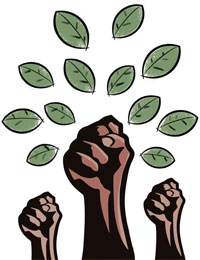
Last month Branko Milanovic published a blog post about the Yellow Vest movement against the fuel tax in France. He was worried – like many analysts – that the uprising proves it will be virtually impossible to roll out the policies necessary to reduce carbon emissions. He’s convinced that people simply won’t accept it. Why no socialism in Sweden?

The Wage-Earner Funds in Sweden is one of the few serious attempts in an advanced capitalist society to socialize the means of production. Developed by Rudolf Meidner and Anna Hedborg, two economists at the powerful social-democratic union confederation LO, the plan envisioned a gradual, long-term transition to worker control of the whole economy through regular, continuous transfer of shares to union-owned funds. While it is commonly believed that the plan failed due to intransigent and well-coordinated capitalist opposition, my research demonstrates that its failure was primarily due to the high degree of centralization of the labor unions pushing it. The People No Longer Want Maduro--and No One Chose Guaidó
The following statement was issued by Marea Socialista, a Venezuelan organization. Only the sovereign mobilized people can decide its destiny, in a referendum and general elections The Venezuelan people, mobilized along all social sectors and taking to the streets from the poor neighborhoods, are demonstrating that they are fed up with Maduro. The people will no longer tolerate the policies of hunger and the destruction of labor rights, the elimination of the right to healthcare and shortages of medicine, the degradation of public services, extreme corruption and routine repression. Who Shut Down the Shutdown?
Who ended the shutdown? The Democrats? Nancy Pelosi? Mitch McConnell? None of the above. The shutdown got shut down when workers took Laguardia Airport off-line on Friday, January 25. A rolling disaster of massive commercial disruption was about to unfold for capitalist America and that pushed the GOP over the edge. The Venezuelan People Must Decide, Not Trump
Right-wing opposition leader Juan Guaidó has declared himself interim president of Venezuela against sitting President Nicolás Maduro, and he was immediately recognized by the U.S. government and a range of authoritarian leaders in Latin America. Here, the International Socialist Organization states its opposition to this new assault against the sovereignty of the Venezuelan people. A Labor Movement 2020 Election Strategy
Forgotten voices in Venezuela crisis
Things are approaching a crisis point in the long battle of wills between Venezuela and the White House. Juan Guaidó, president of the opposition-controlled National Assembly, swore himself in as the country's "interim president" before a crowd of tens (by some accounts, hundreds) of thousands of supporters in Caracas on Jan. 23. Against the coup intervention in Venezuela!
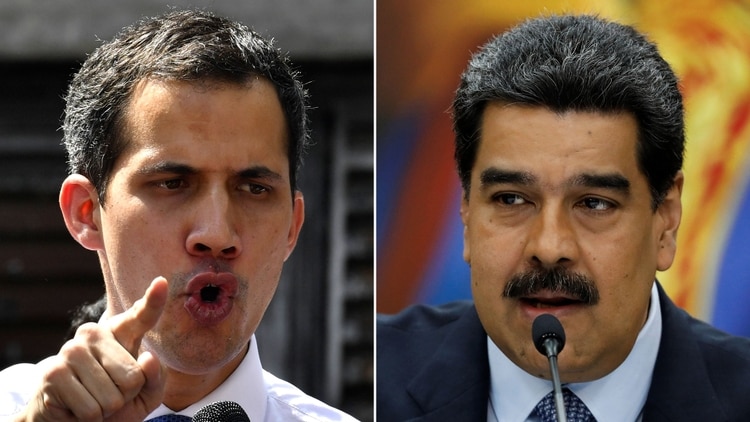
This statement was issued by the PRT, Mexican section of the Fourth International, on 23 January 2019. What do Trump’s ‘withdrawal’ from Syria and the Gulf’s rapprochement with Assad have in common?
In the days since Donald Trump’s announcement that the US was to rapidly withdraw its 2,000 troops from Syria, an enormous amount of speculation about what this means has taken place. In my initial piece, I expressed a number of views that are not widely shared. New York Progressives Must Demand More
I campaigned for governor with the slogan of “Demand More!” because Gov. Cuomo has governed as a social liberal but as an economic conservative. Although he touts the agenda he outlined in his January 15 State of the State and Budget presentation as “progressive,” New York progressives should not be satisfied. It is still a conservative economic program. Progressives must demand more. 100 years after the death of Rosa Luxemburg
The deaths of Rosa Luxemburg and Karl Liebknecht have haunted the imagination of the left for a century. Joe Sabatini reviews a recent publication exposing the events of their deaths, Klaus Gietinger’s The Murder of Rosa Luxemburg, as well as providing an introduction to some of the literary works inspired by the events of 15 January 1919.
What LA Teachers Have Already Won
|






 Labor is prior to, and independent of, capital. Capital is only the fruit of labor and could never have existed if labor had not first existed. Labor is the superior of capital and deserves much the higher consideration. - Abraham Lincoln
Labor is prior to, and independent of, capital. Capital is only the fruit of labor and could never have existed if labor had not first existed. Labor is the superior of capital and deserves much the higher consideration. - Abraham Lincoln




 This memoir of sorts by Fordham University sociology professor Heather Gautney, who became a policy fellow in Bernie Sanders’ Washington DC office and a volunteer researcher and organizer for his unexpectedly popular 2016 presidential campaign, has a very specific focus: to “offer insights from up-close work with Bernie, mixed in with historical and sociological analysis, to perform an autopsy of the 2016 election” (2). Given the sheer number of insightless (to put it mildly) autopsies that have been proffered across the political spectrum—perhaps none more useless than Hillary Clinton’s own What Happened (Simon & Schuster, 2017)—Gautney’s book is more than welcome and even slightly overdue.
This memoir of sorts by Fordham University sociology professor Heather Gautney, who became a policy fellow in Bernie Sanders’ Washington DC office and a volunteer researcher and organizer for his unexpectedly popular 2016 presidential campaign, has a very specific focus: to “offer insights from up-close work with Bernie, mixed in with historical and sociological analysis, to perform an autopsy of the 2016 election” (2). Given the sheer number of insightless (to put it mildly) autopsies that have been proffered across the political spectrum—perhaps none more useless than Hillary Clinton’s own What Happened (Simon & Schuster, 2017)—Gautney’s book is more than welcome and even slightly overdue.




 The tremendous economic, political and moral crisis that Venezuela is going through has not only sunk millions of people’s living and working conditions, but also the political programs that appear confronted to the death in a highly politicized stage. It is the hour of the lackeys. Both sides of the stand-off are in the service of big multinational capital, as bidders of the free exploitation of our enormous natural resources.
The tremendous economic, political and moral crisis that Venezuela is going through has not only sunk millions of people’s living and working conditions, but also the political programs that appear confronted to the death in a highly politicized stage. It is the hour of the lackeys. Both sides of the stand-off are in the service of big multinational capital, as bidders of the free exploitation of our enormous natural resources.
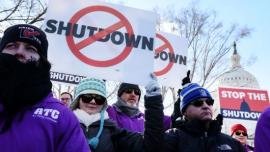

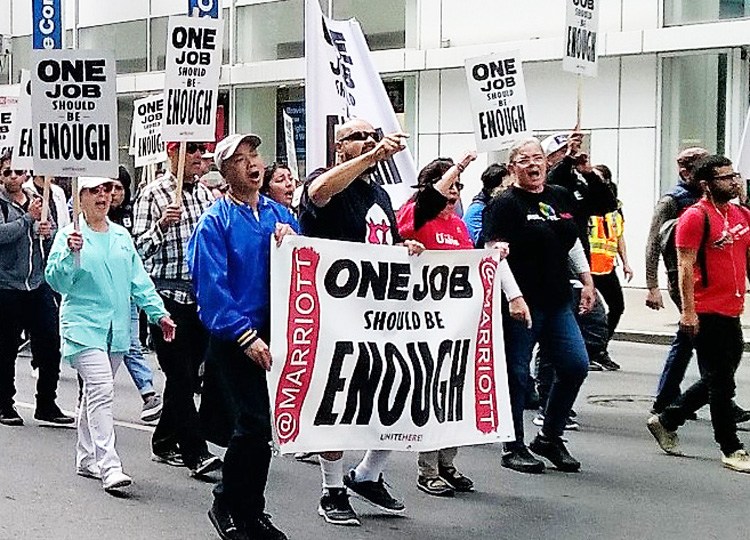 Organized labor has an opportunity to play an important role in the upcoming selection of a presidential candidate in the Democratic Party’s primaries and the eventual November 3, 2020 U.S. presidential election. The stakes couldn’t be higher, not only for the future of the labor movement but for the entire U.S. working class.
Organized labor has an opportunity to play an important role in the upcoming selection of a presidential candidate in the Democratic Party’s primaries and the eventual November 3, 2020 U.S. presidential election. The stakes couldn’t be higher, not only for the future of the labor movement but for the entire U.S. working class.



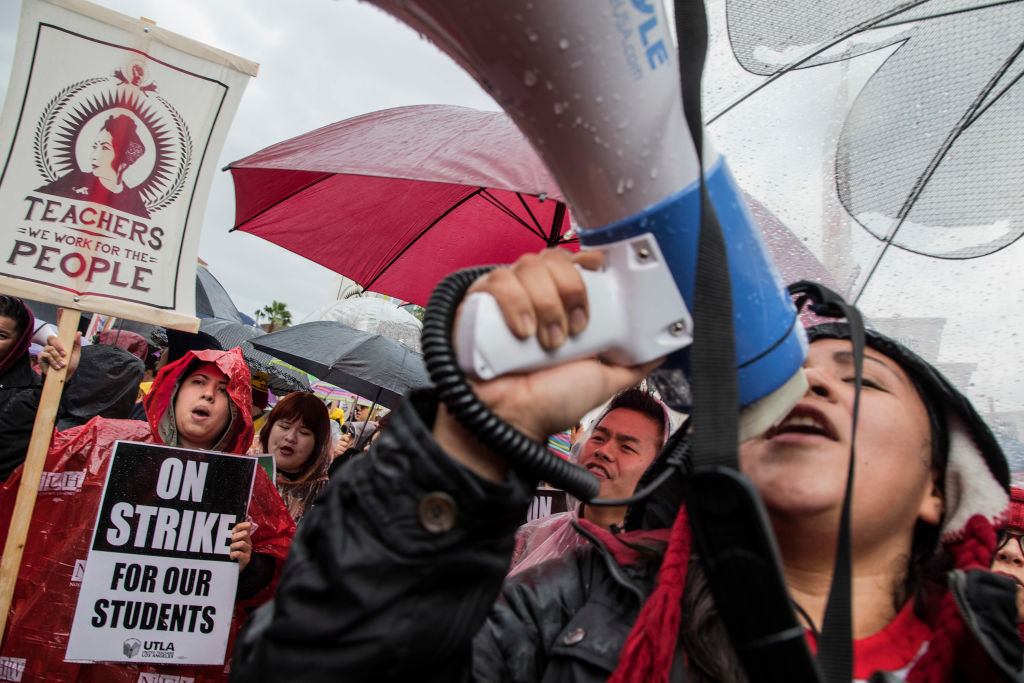 The United Teachers of Los Angeles (UTLA), the city’s teachers union, has now reentered negotiations with a school board chastened by a strike that has shown the movement’s political power in massive demonstrations with community members and parents.
The United Teachers of Los Angeles (UTLA), the city’s teachers union, has now reentered negotiations with a school board chastened by a strike that has shown the movement’s political power in massive demonstrations with community members and parents.



 This essay was originally a talk at the conference held at the New School for Social Research on April 21-22, 2016.
This essay was originally a talk at the conference held at the New School for Social Research on April 21-22, 2016.